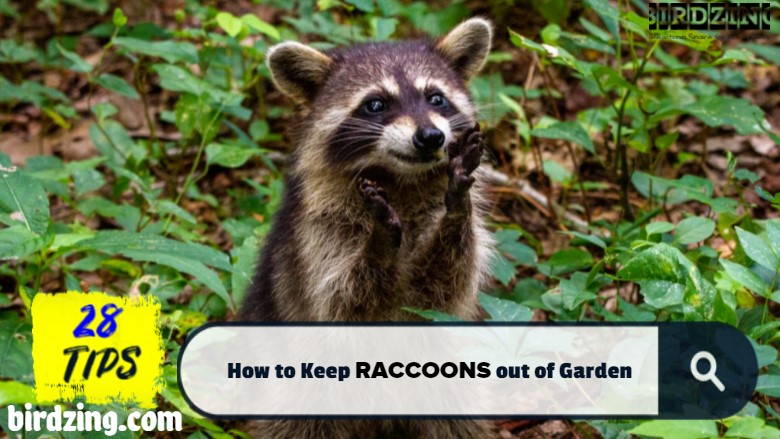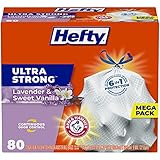If you have a garden or have recently started to grow plants, you are aware of the importance of keeping raccoons away from your property. There are many ways to deter them and some methods can be quite expensive. While there is no magic wand to keep raccoons away, here are some products that can do the trick.
Raccoons are secretive mammals that thrive in urban and rural environments. The rapid growth of the human population has provided them access to a wide variety of food sources, including garbage from human homes. That has created a significant problem for humans as raccoons feed on over 50 million tons of food waste each year.
About 40 percent of North American urban/suburban nuisance animals are raccoons. Its body mass can vary depending on the time of year. In Ohio, raccoons lost more or less 16% of their body weight over winter. In Washington, the raccoon’s body weight dropped to 10%.
The USA Midwest has seen a dramatic rise in the population of raccoons over more than 15-20 years. From 1950 to 1990, only 10-15% of mutilation to harvests by raccoons. Today, 94% of significant crop damage by raccoons. It’s tough to believe![efn_note] Ref: https://www.researchgate.net/publication/286975707_Long-term_population_trends_of_raccoons_in_Illinois [/efn_note]
Mutilation of corn by this animal is a dangerous challenge among more than 25% of farmers in the USA, third only to deer. When corn is available, raccoons can consume up to 50% of their diet of that crop. Many diseases they carry are harmful to both human and pet health; examples of conditions include fleas, rabies, and parvovirus.
Raccoon rabies is highly contagious and can spread quickly through both wild and domestic animals. It is more dangerous to wildlife than the raccoon strain currently affecting skunks and other animals in Missouri. Your pets are especially vulnerable to raccoon rabies because they tend to hang out in attics, chimneys, porches, trash cans, etc.
Legal Status of About Raccoons
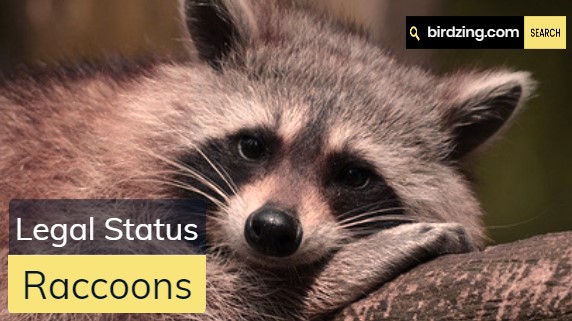
Raccoons are protected species in Missouri. State regulations allow landowners to maintain their property and wildlife populations through the use of non-lethal methods of control. For more information about how to minimize damage caused by raccoons, contact the Missouri Department of Conservation.
How to detect a Raccoon Problem in your garden or yard?
Raccoons can get into the most surprising places- from attics to chimneys, and especially gardens. If you’ve got a pesky Raccoon in your garden, then you’ve come to the right place. Here we’ll look at what you can do to identify and deal with a raccoon problem.
Most pests don’t mind if you have a garden. As long as there are some delicious plants, they’ll check it out. If you want to attract them, do so in a way that’s fun and interesting! An excellent hobby is gardening. Don’t let the potential of attracting pests inhibit your enjoyment of the experience.
So if you want to keep your garden from being overrun by raccoons, you need to be vigilant. Specifically, we’ll talk about how to identify and deal with raccoons and their loitering in our gardens.
Raccoon Tracks
It’s inevitable that wildlife will explore your garden. There’s a good chance that raccoons, squirrels, or other critters might get into your yard. The more you look for signs of these critters in your garden, the better you’ll be able to avoid any problems.
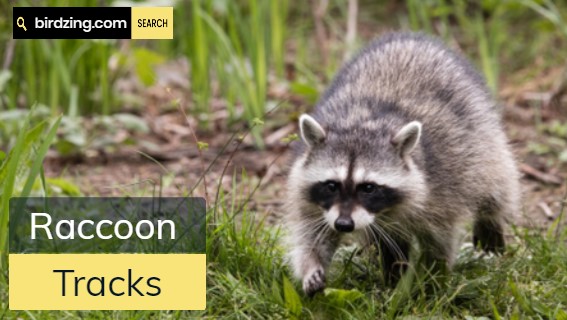
Raccoons are very intelligent and can be trained to retrieve plants for you. They’ll be too busy ruining the lawn. If you find raccoon paw prints near your garden, then they may have been there recently. Before they leave their destructive paw prints everywhere, these little woodland creatures will probably first leave behind some of their distinctive footprints.
Raccoons are capable of fantastic dexterity since their feet and hands are well-designed for grasping and holding objects with skill. They’ve five extensive fingers and a thumb on both hands, which is the same number of fingers as humans. Their hands and feet are also very flexible, just like human hands and feet.
Look for raccoon tracks in your garden. That is an excellent tip for finding raccoon signs. Ways are very distinctive, and they look like tiny handprints. If you notice these tracks all over the lawn, it’s a proper indication that raccoons just about entering your garden.
Look Out For Raccoon Activity
Raccoons are common in the city. With an abundance of food, they are always on the prowl for anything that can be used as a meal. They leave behind evidence of their activities as they go through your yard. The most important thing to do is keep an eye out for damaged plants or other items. If you see marks left by raccoons, take care of the damage immediately and call us for help to prevent future damage.
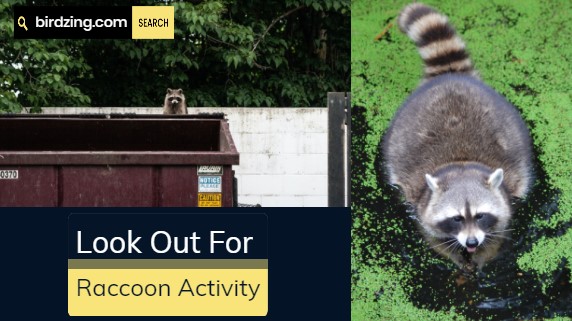
Check for 2-3 inches wide holes in your lawn to avoid raccoon digging. Raccoons love to dig up soil to find tasty insects. It’s a good idea to cover the holes in the yard with expandable foam before a raccoon can get access to your garden. The loose soil makes an excellent target for digging.
Also, pay attention to birdfeeders in your yard. They can be easy targets for raccoons. Squirrels and animals such as raccoons can climb onto a birdfeeder, but they may have to damage it to get at the food inside.
How do you deal with a raccoon problem? Should you use repellents and deterrents or just keep them away altogether? The answer to this question depends on your goals. Let’s have a look at this process from every angle.
24 ways to keep raccoons out of your garden or yard
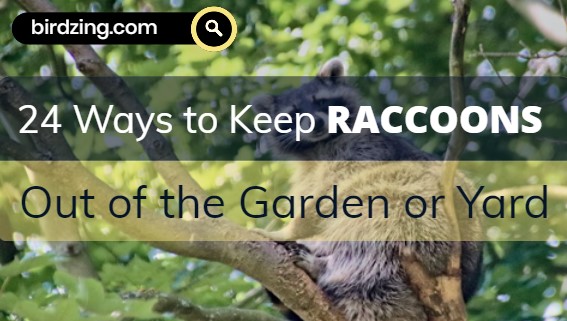
There are so many ways in which you can keep raccoons out of your garden or yard. We’ll look at some of the most effective ways of doing this and then look at how to identify if you have a raccoon problem in the first place.
Motion-activated Sprinkler
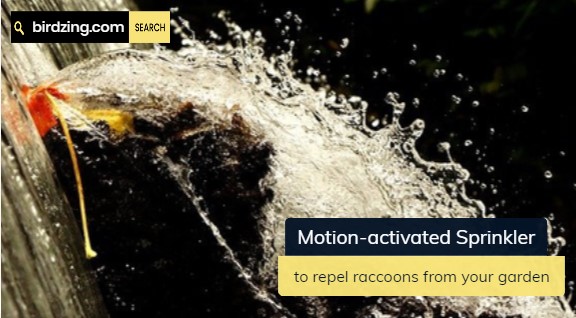
A surprise attack never fails. There’s nothing like a sudden burst of water to scare raccoons away from your garden. But this method is not for everyone. If you’ve overwatered your plants in the past, it may result in over-fertilizing and increased water bills.
If you’re looking for a solar-powered, motion-activated sprinkler to repel raccoons from your garden, you may want to consider one of these. They are most effective in small areas — up to 5 square meters, perfect for a small garden. You can watch the related video below to learn more about the product.
Ultrasonic Repellers for Animals
Another way to prevent raccoons from entering the attic is by using an ultrasound animal repeller that emits sounds like distress calls of different predators. Sounds must be convincing and loud to scare away these pests, which makes this method quite expensive.
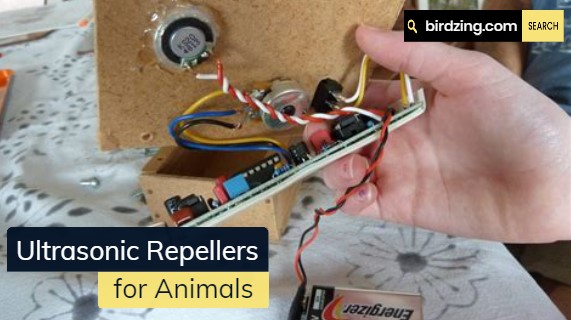
This ultrasound animal repeller emits a loud and sudden pulse of sound that scares away raccoons, skunks, and other non-native species.
These effective ultrasound animal repellers are raised off the ground and make no contact with the environment. It can be mounted on a balcony, in a garden, or attached to a porch. It detects motion up to 33 feet away and emits an intense, high-pitched sound that even large cats tend to avoid.
Using Scented Trash Bags
Raccoons are notorious for raiding trash cans and stealing food. To prevent raccoons from getting into your trash, cover the can tightly with a lid that locks securely. You can also attach a bungee cord to the bottom of the can to secure it so it won’t open easily.
If you’re looking to buy scented trash bags, then the Mint-X Trash Bags is the brand for you. These bags are made from 100% recycled material and help you eliminate odors in your yard.
These trash bags are infused with a methyl salicylate odor, which will work perfectly for you. Since these regular raccoon disincentives are harmless to use, there is no risk of health risks to the people who treat the rubbish.
You can bag up your food remains in this handy trash liner. Its minty fresh aroma keeps raccoons and other nuisances away from your trash, while its strong smell masks the odor of foodstuff to retain them from revealing it.
Sprinkling Blood Meal
To keep raccoons from munching through your garden, scatter blood meal around the plants. This repellent will repel not only raccoons but also rabbits and groundhogs. These deterrents work best if you have a raccoon that is acting up. Otherwise, the raccoon will quickly adapt and leave the area once the barrier is washed away. These barrier methods work perfectly in your garden.

Using Wood Ash
You can also use wood ash to defer raccoons. Remember to reapply frequently, as it will not work if applied on wet grounds. Any type of ash will work for this project. You can make wood ash by saving the ashes from your fireplace for a few months to a year, depending on how severe the fire was.
A fact to Consider: Though it may sound strange, blood meal and wood ash are truly great fertilizer. Their use has been recognized to keep away many pests and increase soil significance over time.
Ammonia
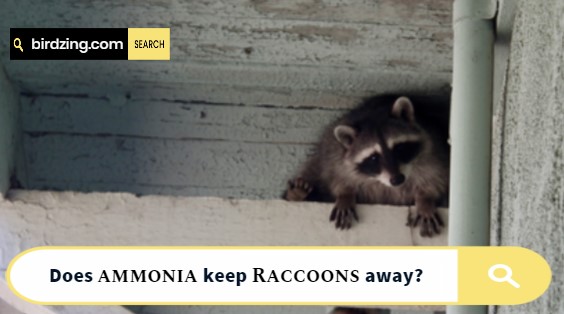
To keep raccoons from peeing or pooping in your garden, you need to use ammonia as a repellent. Because this chemical will give urine a peculiar smell, this smell will repel and seal the raccoon’s urge to urinate and defecate in your garden.
You need to dump ammonia-soaked tatters close to the garbage container. At that point, don’t forget to ground pepper ammonia around the garbage container to discourage raccoon visits. After a week, replace the ammonia-dripping tatters with new ones. Continue doing this until the raccoons have given up their hunt for rubbish.
Caution: Unluckily, ammonia doesn’t work as a deterrent. The raccoons will not go near the stuff. They will not be affected by it either. It is also a good idea to find a better way to get rid of these animals. Many other poisons are less dangerous than ammonia, so there is nothing wrong with trying one of them instead of ammonia.
Chili powder and Garlic bulbs
The Garlic bulbs-chili mixture is a natural repellent to raccoons. Sprinkle this mixture around plants or crops to repel nursing raccoon. If you can still smell the mix after it has been on for five days, then you have managed to keep most of the raccoons away. It’s not safe to use this mixture outside, even in a contained space. This product is only intended for indoor use, not for outdoor use or for pets and kids.
Remove Food
Raccoons are common pests that will tear up your garden if they find any food source or food bins on the lawn. If you have a pet, consider using a dog bowl rather than leaving out food for it outside.
These wily creatures are nocturnal animals and quite clever. We can keep them away with the following: Secure trash, compost, food bins, and bird feeders with animal-proof containers or keep them locked up in a shed or garage. You need to store pet food in a tight container. Remove all ripe fruit from your yard, especially if it is rotten because nursing raccoons love to eat spoiled fruit.
Planting Squash
The easiest way to keep raccoons away from your garden is by planting various plants that naturally repel these pests. For example, if you plant squash around the garden as a fence, these animals will avoid your garden no matter what because the raccoons hate to walk on the squash due to the prickly vines.
You can use this natural repellant for rabbits too, but it works better on raccoons. If the raccoon passes through the area, it will adapt to the squash and learn how to jump over it.
Electric Fencing: Will an electric fence keep raccoons out?
Electric fences are the best option for keeping raccoons out of a garden. These wily creatures are very agile animals and are not easily repelled by traditional fences. Electric fences are effective at discouraging raccoons from entering a lawn.
With raccoons adept at climbing, probabilities are they might attempt to take off the chicken coops. Install a hot wire at right angles of the coop’s top and a ground wire beside the coop’s bottom. This technique will disappoint raccoons from trying to climb over the fence.
Electric fences from multiple strands of wire are used to secure and keep animals and humans away from valuable resources like cultivated crops. They require expertise to install and maintain.
Secure your garden with a 2-wire electric barrier. The higher the fence, the more operational it is at keeping interlopers out. Use a timer to run the barrier methods just after dark.
Caution: Electric fences can be dangerous to both people and animals. They must be used according to local laws and ordinances and following common sense. Electric fences should not be used around small children or pets. Signs should let people know how to use the fencing.
Sealing Chimneys
If a raccoon is about to have a baby, it usually gives birth in tree holes, and the chimney looks just like one. The child will be born soon, and you need to seal the spark arrester or chimney before it can crawl down. Check if there’s a mother raccoon in there first.
Playing Radios
If you live in a place with no one to complain to, or you don’t care what your neighbors think about your radio choice, then this strategy is for you. Turn on your radio and set it to medium-volume. It will be annoying to those who have to live with it, but it’s the perfect way to annoy only animals like a raccoon.
Blocking Access to Water Source
Raccoons are excellent swimmers and like water. The only way to stop raccoons from coming around so often is to prevent them from accessing water sources. That can be accomplished by blocking access to all water features in your yard.
Creating a Trap
If you want to trap a raccoon that has been infiltrating your garden, here’s what you should do: Before placing any traps in your yard, read through the laws about humane traps building and make sure you are following what is allowed. It’s better to be safe than sorry by reading the directions for this situation than being fined or cited for something you didn’t even know.
Step 1: Either purchase or borrow a raccoon trap that is large enough to catch a raccoon. If you don’t have access to a raccoon trap, consider borrowing one from a neighbor or other animal enthusiast.
Step 2: Try to place the food bait in the vicinity of the other end of the cage. Check which vegetable or fruit does your raccoon-like most from your garden, and put that if possible as food bait. Also, remember that raccoons can eat pretty much anything.
Step 3: Now, let’s report this to the animal control department. The animal service will likely come and remove the raccoon soon. I suggest that you feed the nursing raccoon in the meantime.
Signs of Raccoon Movement
Raccoons are pretty aggravating, but we should realize that it’s not their fault if we leave food out for them. When you know how to tell if a raccoon has been eating from your garden, you can be more proactive in addressing the problem.
Let’s get to know the basics:
- Paw Prints— they have five toes on their front paws and four on their back feet.
- They leave behind a fecal substance known as a habitually leftover scat while feeding on fences or trees.
- These paw prints are also an indication of garbage containers being ransacked.
Raccoons are omnivorous, which means they eat a lot of different foods. You can quickly identify them by their dark masks that they wear to defend themselves from the sun.
They’re known as exceptionally skillful hunters that don’t miss any chance to get their fingers on foodstuff. They’ve handy tiny hands that permit them to achieve energetic actions such as running, hopping, reeling, and mounting.
Homemade Pepper Spray
A great way to protect yourself and your family from harm is making homemade pepper spray while enjoying the great outdoors. You can make it by boiling water mixed with hot sauce or any fresh hot peppers. After it has cooled, fill a spray bottle and spray the concoction near trees and around the perimeter of your yard.
Pet Dog
A raccoon will fight to defend its territory if it must. Otherwise, it will avoid conflict as much as possible. It will prevent war with dogs since the dog is unlikely to defend itself against a determined raccoon. However, if you have a big dog, the raccoon might become more aggressive towards your pet.
If you consider keeping a raccoon as a pet, please be aware that wild animals carry many diseases. Also, they can cause considerable damage to your private property and pose a serious threat to your family’s safety. While raccoons can be aggressive and territorial, a well-trained dog or cat is likely to fare better in the role of household protector.
Garlic Bulbs
If you have a garden, there are certain plants that raccoons seem to dislike. Garlic bulbs are one of them. We all know that the stink of Garlic repels parasites, but that is not the case. The raccoon doesn’t like the odor of garlic juice since in its natural atmosphere, and it belongs to a similar family as Garlic and onions.
Using proper landscaping
The basic premise of using landscaping to keep raccoons away is relatively simple: arrange your garden in such a way that it appears unpleasant and distasteful to the raccoons.
Less is more. The best way to discourage a raccoon from entering your garden is to take away the things that make them feel at home. Remove or replace any features in your garden that make raccoons feel welcome.
You will need to make sure shrubs or bushes surround your garden. You can use old, discarded shrubs from another private property as long as they are out of the reach of small animals, such as raccoons and possums. You can also use netting or chicken wire to create a fence around the entire border of your garden.
Taking care of your garden will discourage raccoons from coming around to eat your plants. Keeping your garden trimmed and free of debris will make your home seem less appealing to raccoons so that they will move onto an area with a more natural and open environment.
Sprinkling Cinnamon
Cinnamon has a long-lasting fragrance that can make raccoons dislike your grass or flower garden. However, it’s a decent spice to use as it lasts for a long time compared to other herbs, so you can accumulate without disturbing the finish.
You must use the correct amount of repellent to keep raccoons out of your lawn. Fundamentally, you should place cinnamon in significant positions where raccoons have a tendency to go.
Epsom salt
Epsom salt is an effective deterrent for raccoons and is also an effective fertilizer for your garden. No need to mix it up; just sprinkle the powder directly onto plants. It’s effortless to use and doesn’t require mixtures.
Place a handful of Epsom salt in a bucket and place it just outside your garbage cans, food bins, or your chicken coop. The longer you leave it there, the more effective it will be. The smell that it emits will deter raccoons and other creatures long enough for you to let the strong smell dissipate naturally.
Raccoon Remover Eviction Fluid
If you think a feminine raccoon is in your garden or lawn, you should use a removal eviction fluid to drive her away. In a research executed by unl.edu, it was verified that a raccoon’s superiority could be damaged by reproducing the odor of a new male raccoon.
Eviction fluid is a powerful weapon against pest infestations. It does not harm humans, pets, or even insects. It’s a highly effective way to deter and kill pests that are unwelcome in your lawn.
It’s best used in the roof space, chimney, or any area where you want to repel a nursing raccoon. The strong potent scents will make the female animal leave the site, and it will also mimic the powerful odor of masculine raccoons that are very threatening to nursing mothers.
Predator Urine
Another excellent deterrent against raccoons is predator urine. Not only does it repel raccoons from your house, but it also tricks them into thinking that there are already other predators in the area. If raccoons have been using your house as their home before, they’ll believe that an actual predator has arrived. That will force them to move to a safer location.
Not only are predators marking their territory, but they’re marking it with the same thing you use to keep your territory. Using the same methods, you can better understand and take advantage of the relationship between predators and prey. Whether you use a spray bottle or a large garden hose, be sure to get urine in all the corners – especially corners that other predators have previously marked. That will help you find new food sources and increase your chances of survival.
If you need to deter some predators in your yard, Predator Pee Original Wolf Urine is an effective alternative. You can easily find it in local or online stores. This type of product works best in areas with wolves, coyotes, or mountain lions.
Habitat Adjustment
Raccoons are famous for living all over the United States, as long as they can offer them peaceful entrance to a food resource. They’re primarily decent at use their quickness to reach spaces that you never assumed would be potential for these raccoons to use as ways. It’s essential to begin creating the alterations as soon as these raccoons leave the garden to prevent upcoming damage.
It is necessary to stop raccoons from entering your lawn in the first place. We recommend that you use these simple defensive measures to keep the little raccoons out of your garden.
Remove Fruits
You can keep this animal away by ensuring that the tree branches aren’t dense. Raccoons are less prepared to climb trees when the branches are clipped down sufficiently high for them to get a decent grip. And you might avoid loading food in the garden by keeping it in wrapped bowls.
If fruit doesn’t taste flavor well, never eat it. Whether you have a garden or not, dispose of it away from your house. In the same way, if a food item doesn’t taste good, you don’t have to eat it.
Decoy Plants
You might be shocked to know that you can essentially use fake plants on the lawn to deter raccoons and other critters from eating up your veggies. The point is to keep the raccoons so busy searching for the decoy plants that they won’t have time to bother with your actual garden.
The raccoon doesn’t pay attention excessively to what it’s eating if it gets a little bit of food to eat. Offering a complimentary serving of some vegetables means nothing to you will be upright for this animal and repel them from your valuable corn and tomatoes.
If you would like to validate your yard is safe, you should use a decoy. You can plant them distant from the lawn to keep the raccoons away. It’s a good technique, but it doesn’t always work.
Mothballs Technique
Mothballs are a popular method used to get rid of raccoons. It’s a safe and effective way to keep the pesky animals out of your home, but using them wisely is crucial. They can be toxic to people and pets. So, never store them in places where they’ll be exposed for prolonged periods. Also, don’t allow children or pets to eat any mothballs you use.
Call an Expert
If you are still seeing raccoons raiding your bird feeder, garden, or home, it might be time to call in the professionals. A professional wildlife removal service can put an end to these pests once and for all.
If you have a raccoon and it’s been around for quite a few weeks or months, perhaps you had better get that raccoon out of the garden. Raccoons regularly travel in packs, more or less like puppies, so if you notice more than just a single raccoon, then risks are upright that there’re litters close to someplace. If the raccoon is a real trouble, contacting specialists to get rid of the raccoon is mainly in your best interest.
If you’re hesitant about what to do and don’t know who to call, it possibly will be supportive of contacting the local raccoon pest control organization. These specialists are proficient in handling raccoons that are sick or hurt or have been involved in an occurrence that poses a risk to themselves or others. They will be glad to provide you advice by sharing ideas. These resources will help you in particular circumstances.
Frequently Asked Questions (FAQs)
Does Irish spring soap keep raccoons out of the lawn?
The Irish spring soap helps keep away raccoons and deer. The unique ingredients in the soap repel these animals and keep them away from your garden. You can also sprinkle the soap on the balcony or porch to keep these animals away.
How do solar lights deter hungry raccoons in your garden?
Raccoons are active in the garden at night. To avoid them getting close to your garden, you can use motion-detecting flood lights and Solar Predator raccoon pest control Lights. If a raccoon gets too close, the solar panel will activate the flood lights.
Does white vinegar keep raccoons away from your garden?
Raccoons can be deterred by sprinkling white vinegar or peppermint oil around the yard. Since raccoons are natural scavengers, they will avoid foods that taste or smell bad. You can also use Garlic bulbs, Epsom salt, and peppermint oil mixture to keep them in the inlet. You can make a concoction of these ingredients and spray it around the garden and trash bins.
What do raccoons hate?
Raccoons have the unique ability to be able to detect smells like human perspiration. Using certain potent scents they dislike, for example, garlic juice, onion, onions, and peppermint oil, you can repel them from entering your property.
To keep raccoons out of your home, use light and human voices to repel them. One way to do this is by placing reflective surfaces or flashlights in your home. When they are active in the garden at night, these reflective surfaces and lights will help repel them.
What type of plants does the raccoon love to eat?
Raccoons will eat more or less every fruitlet or plant you plant; however, they might have weaknesses for certain foods. Any tree fruits, corn patch, grapes, nuts, beans, berries, and peas are their preferences. They mainly like melons and sweet potatoes. They will steer vibrant of garlic juice, chili peppers, and onions.
They love meat too. They’ll eat anything that doesn’t move, including snails, bugs, eggs, and the occasional dead mouse. But they’ll never kill a live animal as part of their diet.
How can you stop raccoons from pulling up the grass of the garden?
You need to install a protective electric fence for the first few weeks so the raccoons will not enter the lawn. External security cameras and motion sensors are an excellent option to alert you to a raccoon’s entry. It is also conceivable to scare them away with sprinklers or mothballs.
What is a regular deterrent for raccoons on your lawn?
The most effective technique to deter raccoons from the lawn and yard is to use a mixture of hot peppers and dishwashing soap. It’s a very reasonable way out, even though it does require you to buy products that aren’t available in all regions. The cayenne pepper mix works most realistic if you use it in a sprig bottle with a trigger sprayer.
Will vinegar keep away raccoons in the garden?
Raccoons can be deterred by vinegar. They generally avoid the odor and flavor of it. To stop raccoons from staying in your yard, you should try spraying the garden area with vinegar or using a rag to sprinkle vinegar everywhere.
How can you keep raccoons out of the tomato garden?
You can use various techniques to look after tomatoes from pest animals like raccoons. To get the best results is to use a fence around the garden. Animal deterrent sprays and bird nets are additional practical methods to keep raccoons at bay.
How to keep raccoons from mounting the feeder’s legs?
To deter raccoons, put Vaseline on the legs of the feeder. It’s a practical and considerate way to keep raccoons off your tools. Also, you can try carpet clip strips, but they’re useless at retaining raccoons away. It would be best if you killed them to keep them away in this method.
Does raccoon eat protein pellets or corn patch?
Raccoons don’t like any type or variety of protein pellets. They’re not primarily fond of corn also. But most essentially, they don’t love the record rack sportsman’s selection of protein pellets. Don’t use no matter which but corn for the raccoon’s food.
Does raccoon or rabbit love to have salt licks?
The salt licks are as common amongst the animals that live around here as they are with humans. Opossums, raccoons, Rabbits, Deer, and voles all visit the licks for a flavor of salt. Coyotes, turkeys, and foxes don’t go close to salt licks to any extent.
How to control raccoons on your lawn?
Small lawns can be protected with netting or fur-bearing animals to deter raccoons from entering and eating the ripe fruits. Baffles on tree trunks, overhanging branches, and fence posts will prevent these night-time animals from launching themselves into the plants.
How can you throw out raccoons in your garden or lawns shed?
Raccoons will urinate outside of their burrows if they get any odor from ammonia. Garden specialists suggest placing textile materials with ammonia-dripping cloth inside a bowl and placing it in the space wherever a raccoon comes again and again. The odor of ammonia will habitually infuse the air and discourage them from returning.
Final Words
If you’re having an ongoing battle with raccoons invading your garden, then we have a few solutions for you. I can search online, and it’s easy to find many different ways to keep raccoons out of your yard. Everyone has their preference as far as methods go. Try the one that suits you best, and let us know which way worked for you.
If you’re having problems with raccoons or looking for a solution to keep them out of your yard, please let us know. Our BIRDZING specialists will be happy to help you find the best solution.

I love gardening and hope you enjoy reading my post as much as I enjoy writing it. I focus on plant-based living and believe that you will be healthier and happier by incorporating more plant-based foods into your diet. By providing helpful tips and advice on everything from garden design to growing techniques, I want to help make gardening easier for everyone.

